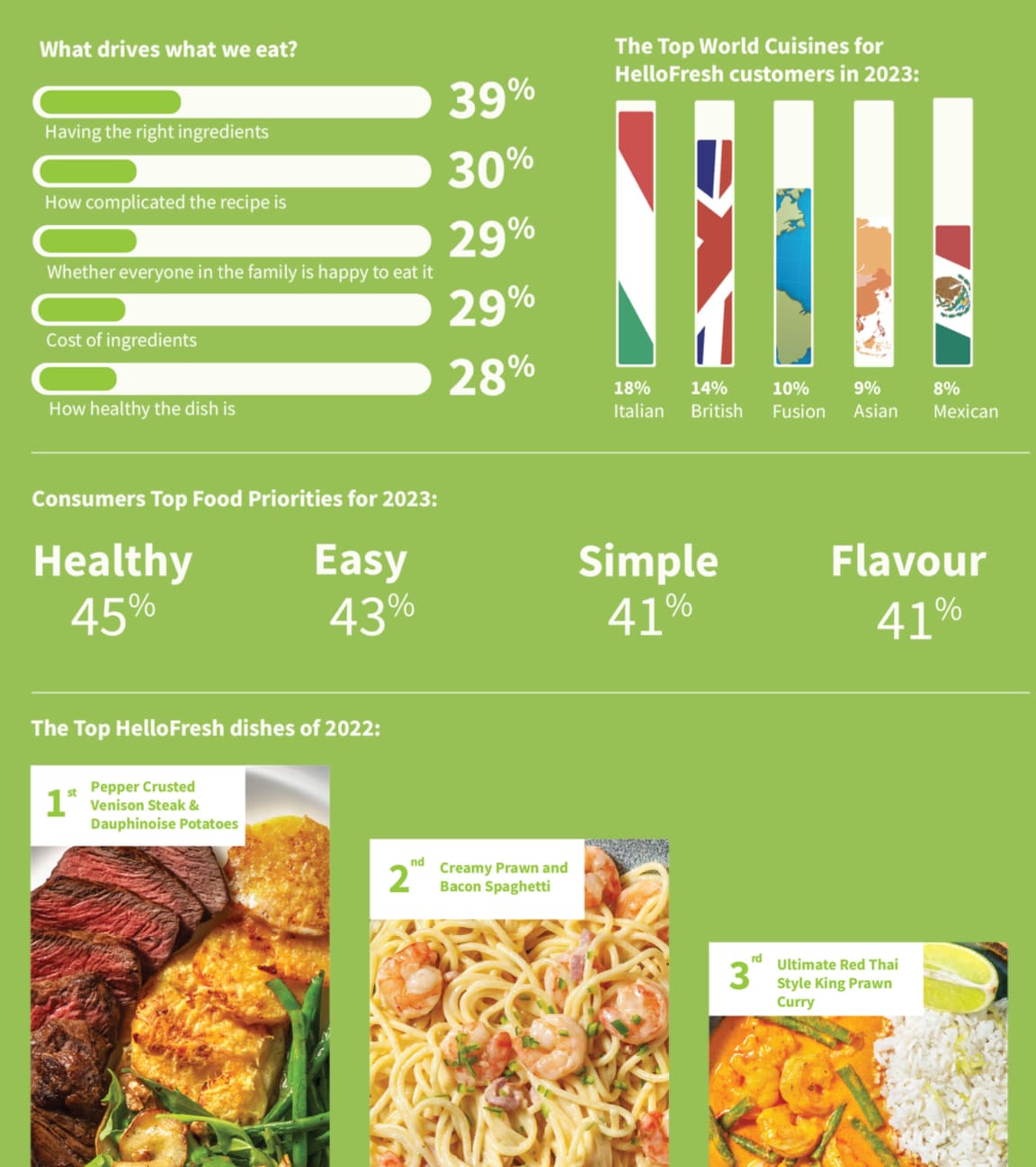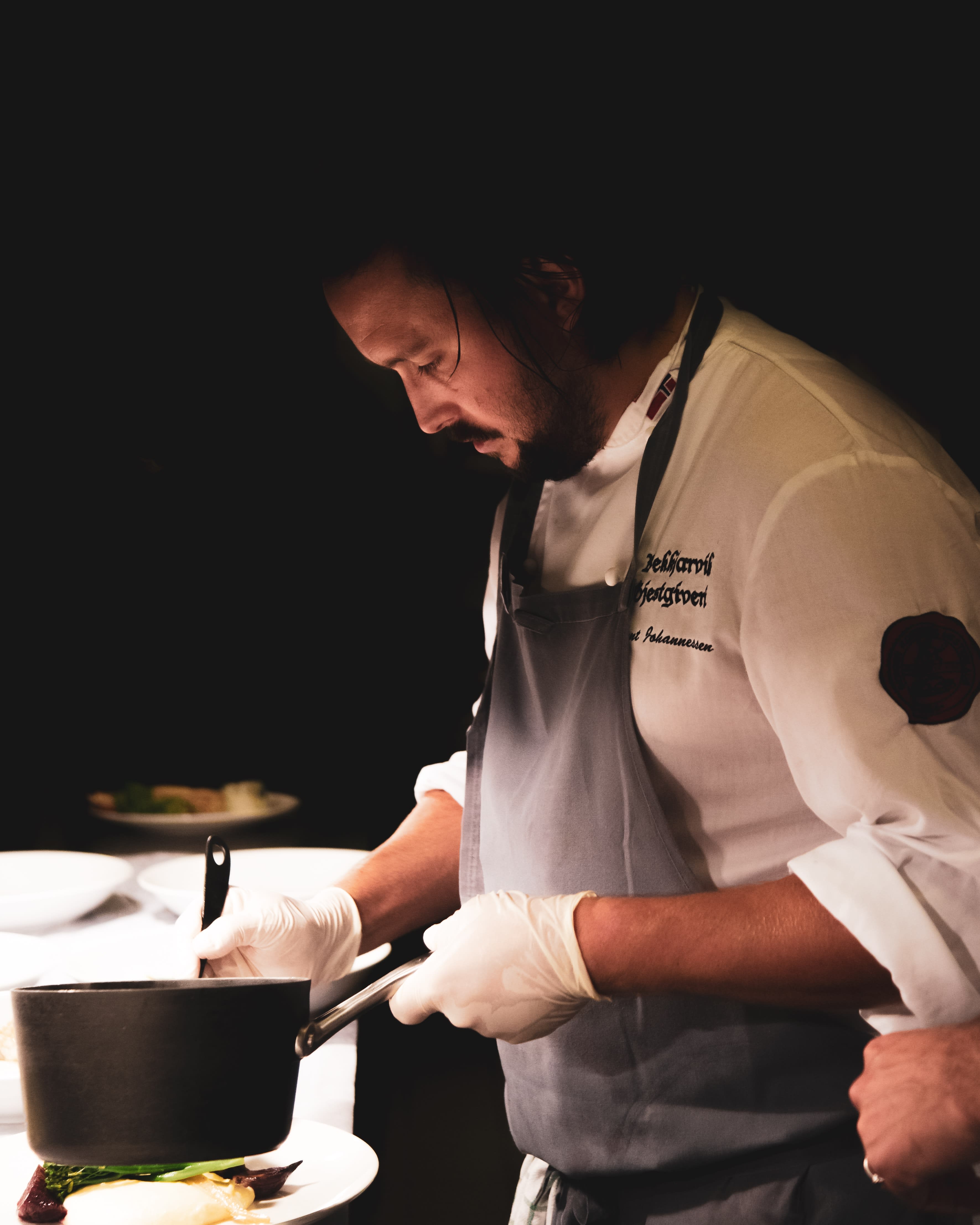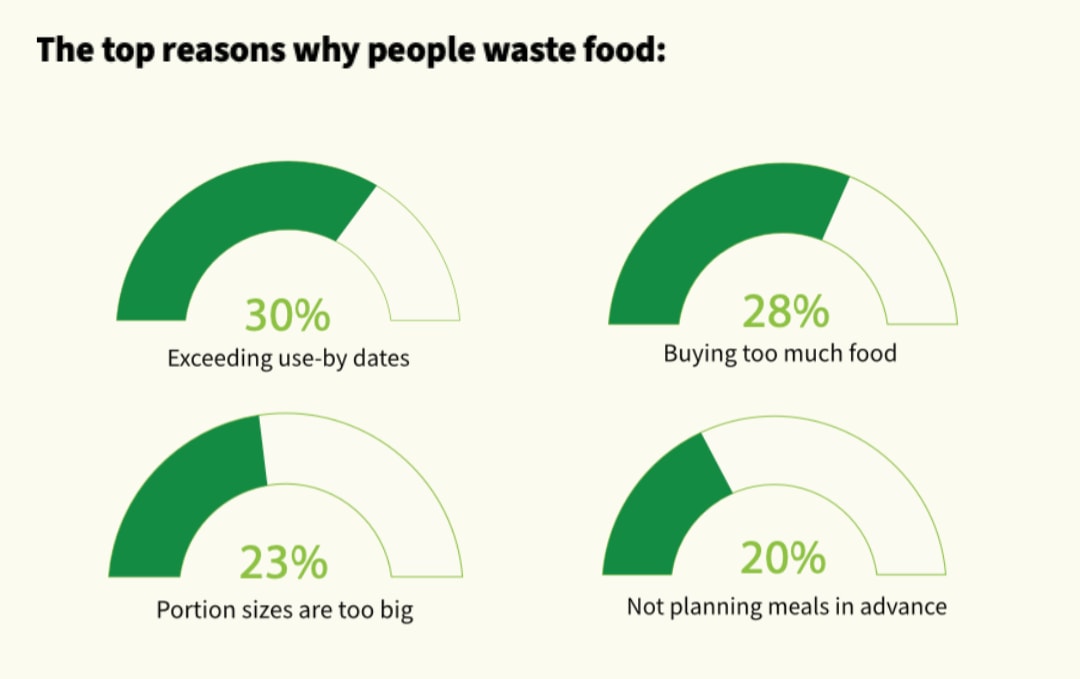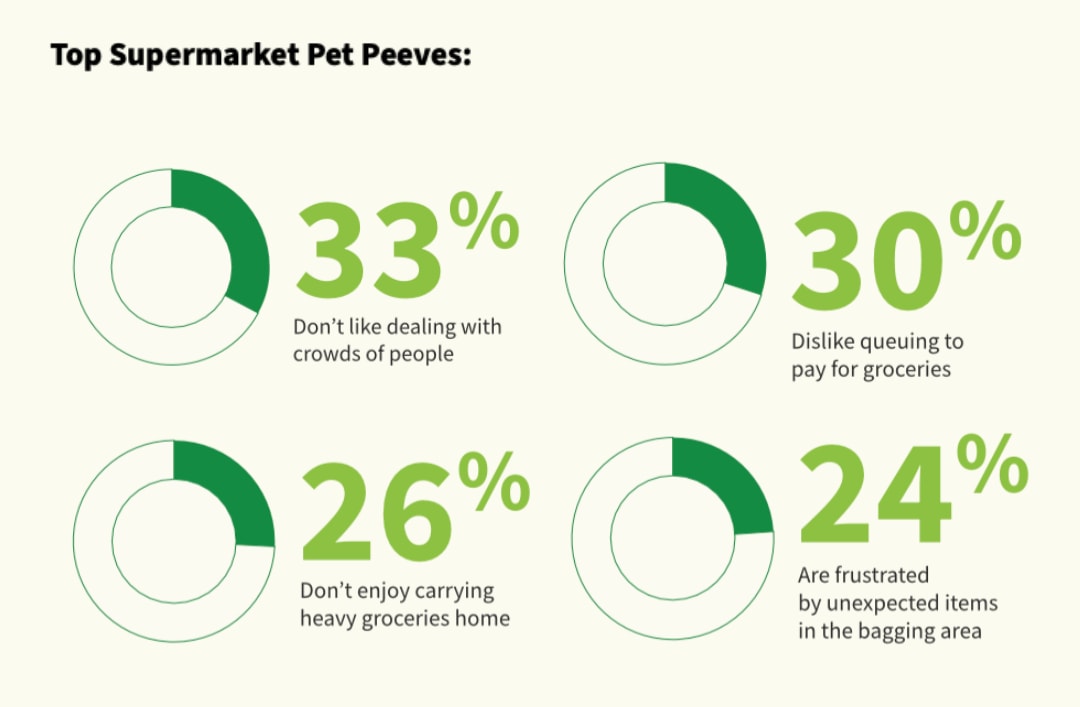
Most popular cuisines

Vegetarian or meat?

Choice of carbs

Most popular dish types

Food in 10 years

What are recipe developers saying?

Most popular cuisines

Vegetarian or meat?

Choice of carbs

Most popular dish types

Food in 10 years

What are recipe developers saying?
Our Predictions: The New Food Trends for 2023

Eating Habits and Food Trends for 2023 and Beyond
Over the past year, we’ve started to settle back into traditional ways of working, with many heading back to the office, even if it may be in a hybrid sense. However, entering back into a life which consists of more commuting, working, socialising and in-person shopping... we can often find ourselves strapped for both cash and time.
Carrying out research across the UK, we found that the average Brit spends six hours a week cooking, three hours deciding what to cook and five hours shopping for ingredients. That’s a total of 14 hours a week and approximately one month out of the year spent solely on preparing food. When food preparation consumes more hours than we spend with our kids (eleven hours), pets (ten hours) and nearly three times as long as we spend exercising (five hours) each week - it’s not surprising that we can often feel like there’s not enough hours in a day, and that we seek to cherish our downtime with family and friends by enjoying a tasty meal in good company. This might be why Brits believe sitting down to a meal together is still a really important factor of family life. In fact, 80% of us believe that a communal meal is still one of the most crucial parts of family life.
2023 could well see a return of back-to-basics cooking, as us Brits are looking to focus on wellness and time saving by prioritising healthy, easy-to-make food over more elaborate and time-consuming dishes.

Brits Want to Experiment with More Korean and West African Food in 2023
In terms of new food trends, it looks like the nation will be casting the net wider when it comes to experimenting with different world cuisines. Our research found that Korean food is the top cuisine people are wanting to eat more of this year with dishes like kimchi, bibimbap and bulgogi enticing British palates.West African food may also be on the rise with a fifth of Brits expressing interest in the cuisine, so we expect to see dishes like Joloff rice and fufu, familiar in Ghana and Nigeria, to be appearing more often in British kitchens and on restaurant menus. Irish food and Filipino food also proved to be popular choices amongst people looking to experiment with new global tastes and flavours this year.
View our View Our African Food Recipes
View Our Traditional British Dishes
View Our Korean Food Menu

2023 New Food Trends Revealed: Top 10 Trending Ingredients To Watch Out For!
- Orange tomatoes
- Avocado oil
- Plant based pasta
- Jackfruit
- Sunflower butter
- Courgette flowers
- Tofu
- Hemp seeds
- Wakame seaweed
- Kelp

Which Food Trends Are We Leaving in 2022?
As we diversify our tastes as a nation and try to pinpoint what the next food trends might be, we naturally say goodbye to some older traditions and habits which we no longer see fit in today’s kitchens.The latest revelations include that a quarter of Brits now believe that eating meat every day is no longer acceptable, presumably due to ongoing sustainability efforts and the vast range of plant-based and fresh product alternatives on the market today.

The Future of Food: 2023 and Beyond
Our research found that 84% of Britons believe that we will change how we source and produce food in the next decade. This could lead to some exciting developments which could change the way we think of and consume food for years to come...Over a quarter (28%) of people said that they would like meals personalised for their own fitness and wellbeing, while one in five said they would relish the ability to view where the ingredients in their food come from instantly, something that is promised from blockchain technology.
Futuristic concepts may not be too welcomed, with the majority of us (82%) are not yet comfortable with having a robot chef cooking up our meals for us. However, Gen-Z are the most likely generation to welcome the rise of AI cooking, with 1 in 5 saying that this is a development they’d like to see in our homes and kitchen in the future.

The Impact of the Cost of Food Rising in 2023 and The Rise of ‘Homegastronomy’
‘Homegastronomy’ is a food trend on the rise in 2023. This term means creating restaurant-quality meals at home, fuelled by the desire to eat in, save money and experience new flavours and cuisines in the comfort of one’s own home.
One of the key findings from our report was that 2023 could become the year of the dinner party, with Brits opting to cook rather than go out and eat to celebrate life’s special occasions. With the current financial squeeze, it’s no surprise that the majority of us (90%) are paying more attention to how much we spend on food.
With price-consciousness and value front of mind for us all, there can be solace found in the fact that six in ten respondents to our survey believe that they can whip up a special treat meal at home without spending a fortune. Shopping around for deals (43%), reducing food waste (38%) and batch cooking (37%) are the top three ways we currently believe we can create great meals at great value. Over a third of the nation (34%) is also turning towards tools such as air fryers and slow cookers (34%) to craft excellent and efficient energy saving meals.
Brits’ Top Ways To Save Money While Cooking in 2023
- Shopping around for deals and food discount codes
- Reducing food waste
- Batch cooking
- Using an air fryer
- Slow cooker recipes

War on waste and the rise of the ‘fakeaway’
We’ve always been passionate about cutting food waste, in a bid to act as a sustainable business, and consumers are increasingly passionate about joining the fight. In fact, four out of five people claim they intend to reduce food waste in 2023. It appears that proper preparation is a useful weapon in this battle with many of us believing that a focus on meal planning could be the best way to reduce food waste, with over a third of us (34%) saying that we’re going to try harder with this in the next twelve months.Home cooking is also seen as something that could cut down on thrown away items - which is why 22 per cent of the nation say they’ll choose to home cook a ‘fakeaway’ when craving a takeaway simply to avoid waste.
Recipe Development Manager, Mimi Morley, says: “Making use of leftovers is a great way to combat food waste. Whether you’ve created too big a portion or simply have some excess ingredients in the fridge - it’s smart to think before you throw out. Safely reheating last night’s dinner can make for a cost effective and easy lunch solution, whilst leftover veg is perfect for a homemade soup!”

Brits Have Many Supermarket Bugbears and Vow to Shop Smarter in 2023
On average we spend 260 hours a year shopping for food – that’s a solid month of shopping! So, it is no surprise that we have a lot of pet peeves when we head to the supermarket. These include dealing with crowds of people (33%), and while we Brits are globally renowned for loving to line up properly, queues (30%) ranked one of our top pet peeves, along with carrying our groceries home (26%).There are also the classic bugbears of queuing behind people who only take their wallet or purse out after the shopping has been packed (19%) and not having a spare pound coin to get a trolley (18%). While finding a parking space in the supermarket car park annoys 17% of people.

New Food Trends and Consumer Behaviour in 2023: In Summary
- The HelloFresh Perspective Report, a snapshot of British cooking habits, has uncovered many interesting facts about how we approach food, and how this might be changing.
- Time moves on but it’s plain that the rituals of cooking and eating are still at the heart of our lives, with eight in ten (80%) of those polled saying they love a family meal at the end of the day. While it looks like we’ll be going back to basics this year with classic easy-to-cook dishes, it doesn’t mean these meals will be boring - or even familiar - whether it is Korean, African or even Irish food, we’re also going to see wider ranges of global cuisine on our plates.
- The financial squeeze is certainly going to have an impact on what we are eating, though cost-cutting doesn’t mean missing out on much-needed celebrations. We’re simply going to be enjoying ourselves in smarter ways, often at home. The need to cut costs also looks to be a large incentive to cut down on food waste - a matter that Britain’s home cooks are serious about.
- Technology, sustainability and events we cannot imagine will continue to define our futures - but whatever happens, food and cooking will remain at the heart of our lives.
.png)
TikTok Foodie Trends Report 2023
"We are a nation united by food. Whether we’re engaging in lunchtime conversations with colleagues, or using a midweek meal as an opportunity to connect with our families, the communal aspect intertwined with food is part of what makes us human.
In this report, we have explored the current landscape of social media and its impact on our eating habits; with a particular focus on TikTok food trends.
From the most influential creators of 2023, to the foodie trends and hacks billions of users have got on board with this year, as you’ll see, TikTok’s power for good in the culinary world is something to behold."
Mimi Morley, Senior Recipe Development Manager at HelloFresh